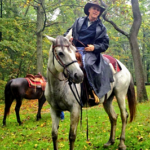
Nearly 75% of all U.S. households have Internet connections, virtual portholes to the online world, according to the research group Pew Internet and American Life. That’s 147 million adults all bringing their hobbies, interests, careers, and daily lives to the Internet.
Little wonder that horse enthusiasts, too, have stretched their spidery web across the Internet. In addition to private and commercial websites covering every detail within the equestrian world, you can contribute and shape your own experiences through online equine communities. In a forum environment, subscribers (users) can interact with one another, posting messages and responses to the entire group.
There are online groups for anyone interested in just about every horse-related topic. Do you like talking history and bloodlines? Equine diseases? Training methods? Then there’s a group for you.
In fact, that’s exactly how an online forum gets started. Someone decides to create a group about a specific topic. Other people get interested and join in. Soon, you have the online-equivalent of the circle around the campfire, with everyone swapping stories and adding their two cents.
Horse enthusiasts are trading arena rails for keyboards as their favorite place to chat with friends, talk to experts, and, frankly, share gossip. The online world, despite its anonymity, has grown to mirror the off-line world, and the result is the online-equivalent of a saddle-club meeting.
These days, it’s difficult to find a horse-related chore that doesn’t have some online connection. While Internet shopping used to be limited to tack and equipment, it now includes horses, too, with eBay-like online horse auctions gaining popularity. Truck and trailer dealers direct you to their sites with updated product info. Even local clubs and organizations are advertising shows, clinics, and events, posting documents, rules and, yes, online entries.
Your guide to sorting this bottomless vat of information is your online horse community. These groups provide a place to connect with a supportive network of fellow horse-loving keyboard jockeys. If you haven’t yet ventured into the online horse world, or have done so with trepidation, we’re here to guide you down the digital trail.
Online Forums:
The Digital Saddle Club
So, how exactly does an online horse community work?
Typically the forum creator or owner is also the administrator or moderator of the group. The moderator is the end-all, be-all, and is generally the one who decides if forum postings will be archived and whether the archive will be made public or kept for members only. The moderator can enable members to conduct interactive chat sessions, post photos, maintain events calendars, hold auctions, create folders to organize message topics, or-if needed-block troublesome users from posting.
It’s not unusual for one company to host countless topics divided into forums, such as Yahoo Groups or Delphi forums . To find a group you might want to join, log on to one of these sites and do a search for your favorite topics.
Round-Up in
the Digital Corral
• Horse-related chat rooms, blogs and websites have distinct interests, personalities and goals, so be discriminating about where you spend your time online.
• It’s often best to monitor an Internet horse community before becoming an active participant.
• Even when a forum seems to welcome lively debate and controversy, be considerate and respectful in your replies to other users.
• Remember, just because you read it on the Internet doesn’t make it true. Be sure to check information
sources to be sure they’re reliable.
• When accessing horse-related websites, use the same precautions you would when accessing other sites to protect your personal and financial data.
• Be careful of what you post, as once it’s in cyberspace, it’s hard to retract.
Getting to Know You
So, who is online these days? Pretty much everyone.
The increasing spread of high-speed Internet access fueled the rise of online shopping and video sharing. And it’s easy to watch horse shows, horse races, and public sales from your home or office. Even the average horse-sale transaction is being altered, with buyers asking sellers to make horse sale videos available on sites such as Google’s YouTube.
There is a detectable gender gap in nearly every online community, including the horse world. Men and women use the internet differently. Men are more apt to go to the source, researching things like breed-specific info, performance records, or clinic dates at a website. Women seek a more collaborative form of information sharing. They nurture the relationships they build online, setting aside the sheer glut of information to immerse themselves in their area of greatest interest within the horse world.
The dynamics of online communities are fairly consistent. Members tease each other, off-list meetings are arranged (usually at clinics, shows, or sales), and new members are welcomed with enthusiasm. Novices may log on, hoping to tap veterinarians, trainers or top amateurs for free advice. When a member’s horse is injured, or a member suffers a loss, their online horse buddies can be an important source of comfort and support. Secret Santa exchanges, birthdays, and new-horse purchases become celebrated events.
While there are large forums out there (Delphi’s fourth largest forum, the Pleasure Horse Journal forum, sees more than 1,000 messages per day from more than 23,000 members), the typical forum size is approximately 30-40 active participants. They are joined by a varying number of members who choose to remain silent, reading and absorbing select information. These members, who don’t actively participate in discussions, are called “lurkers.”
Intense debates can arise over topics such as training methods, but are typically held within the virtual walls of the host forum. While participants may feel their debate is all-important, other completely unrelated forums have their own debates on completely different topics.
It’s easy to mistakenly view a favorite online community as an encompassing, industry-shaping tool-almost as if it’s a collective member of an organization. That is, until you log into another forum and realize they don’t have a clue what you’re so excited about.
With that in mind, it’s always important to take forum postings with a grain of salt. Gossip is still gossip, whether you hear it at the saddle club meeting or read it online. More importantly, horse care and training advice should be left up to your own stable of experts, namely your trainer, farrier or veterinarian. Just because you read something online, doesn’t mean it’s true.
Online Soapboxes
You probably hear people talking about what they read on “this blog” or “that blog,” but you may not fully understand what a “blog” is. Blogs are one-sided, personalized public diaries. Bloggers lay open their creative soul by posting their daily experiences, and, in most cases, permit readers to comment on the postings in a forum-like atmosphere. Readers can respond to each other, but threads are often short-lived as the blogger moves onto new topics.
You don’t have to be a celebrity to have your own blog. You just need to create a personal page on a blog site (many are free) and start journaling. But, be cautious about what you post. Anything you post online is available for the world to read, and it’s nearly impossible to delete a message once it’s sent into cyberspace. Checkout websites like www.myspace.com and www.livejournal.com.
Lay of the Land
It’s far too tempting to assume that our virtual projections of our online friends are held separate from reality. Until we can put a name with a face, it’s a simple matter to use our own stereotyping methods, arriving at quick assumptions. This is, in large part, the foundation for the negative reputations some online communities tend to earn. No matter what the topic, the ability to overlay one’s own imagination over a virtual discussion has led to more levels of annoyance, bickering, and outright keyboard-based fighting (dubbed “flame wars”) than you would ever see in a public setting.
While it may not be possible to avoid the scathing quips of certain contributors (and there’s at least one in every group), you can protect yourself from their slings and arrows with some simple defenses.
First, don’t leave your good judgment, tact, and manners in your chair as you tap into cyberland. Let those positive qualities reach your fingers and flow into your keyboard. The web erases boundaries of time and distance, but not the boundaries of kindness and common sense. If you wouldn’t say what you’re about to type to your social circle, don’t type it online.
Which begs the second defense-the delete key. Many a flame war should have been prevented by simply deleting a gasoline-soaked message. Venting through the composition of a reply can be a therapeutic outlet, centering your thoughts on a topic, but pause before clicking post or send. Save a draft. Get up, walk away. Buck some hay. Reflect. Then return to your keyboard and give the delete key preference over the post or send buttons. You may find that nine times out of 10, you’ll delete the message, or, at least, edit the angry tone to a more polite, conversational tone before sending.
Lastly, if you’ve joined a new group, slip in the door (subscribe or join), find a corner, and sit quietly for a while. This is called lurking. Don’t post or reply, and hold off your eager introduction. More inadvertent toes have been smashed by breaking a group’s established protocols. A seemingly minor faux pas can be irrationally exploded, leaving you to rush into unsubscribing from that group. That can be unfortunate. While the group’s dynamic may have been unusual, the information may have been exactly what you had been seeking. Lay low after subscribing, and when you have the feel of your new community, say hello.
Where to Go
Visit these websites and search for horse-related groups that interest you.
John Lyons’ Discussion Board
Find a community of like-minded Lyons’ training enthusiasts.
www.johnlyons.com (click on Community, then Discussion Board)
Delphi Forums
Home to Pleasure Horse Journal forum and Dreamhorse forum, among others.www.delphiforums.com
Yahoo Groups
Home to hundreds of horse-related groups. Search for one that sounds interesting, or create your own. groups.yahoo.com







